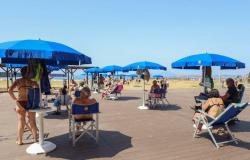
Article Visits: 25
With the arrival of summer, FlixBus strengthens the routes with the province of Potenza and Basilicata, focusing both on the seaside resorts of the region and on those inland. This reflects the company’s desire to facilitate knowledge of the area by supporting a more environmentally friendly approach to travel, based on the use of collective means of transport.
There are five destinations in the Potentino area that can be reached with FlixBus from large, medium and small Italian centres, in some cases even at night. In addition to the capital, the operator’s network connects Picerno in the Mountain Community of Melandro, Lagonegro and Lauria in the Noce Valley and Lavello in the Vulture-Melfese area, offering itself as an ideal solution for an immersive exploration of the territory.
Tickets can be purchased through all the company’s channels: from the website, from the free FlixBus app and from physical retailers throughout Italy.
Throughout the summer Potenza will be connected, among others, with Naples, Taranto and Lecce with more than 30 trips per week and with Rome and Brindisi with over 20 trips. Up to six weekly connections will also be operational with Milan and destinations of historical-cultural interest such as Pompeii or seaside destinations such as Gallipoli.
In the province, up to six weekly connections will be guaranteed between Picerno and cities such as Naples, Salerno, Lecce and Taranto, and up to 12 trips per week between Picerno and Rome. In the Noce Valley, FlixBus reaches the municipalities of Lagonegro and Galdo di Lauria, connected with many of the major Italian centers, such as Milan, Naples, Turin, Genoa, Bologna and Florence, and several of the main Calabrian cities, from Cosenza to Crotone , passing through Catanzaro and Lamezia Terme. The operational routes with Lavello complete the picture, reachable both from nearby Altamura and Gravina in Puglia and from Rome and Benevento.
In addition to encouraging the discovery of lesser-known territories in the region, with these routes FlixBus also aims to contribute to the deconcentration of tourist flows and the promotion of internal areas, recognized by public debate as possible development hubs for more sustainable lifestyles.[1]
There are a total of nine centers that can be reached on board the green buses in the Lucanian area. Of these, seven are municipalities with less than 20,000 inhabitants: by guaranteeing connections also with various smaller localities, FlixBus intends to facilitate people’s movements even towards areas less easily reachable from other regions.
«We believe that an efficient and widespread collective mobility offer can best combine the need for sustainability with that of cost-effectiveness, as well as contributing to creating opportunities for the tourism development of the area», stated Andrea Incondi, Managing Director of FlixBus Italia . «For this summer too, in addition to increasing the frequency of connections on the most well-known and popular national routes, we wanted to enhance lesser-known locations in our beautiful country. The variety of our heritage is a priceless wealth, and we believe it is essential to facilitate access even to less frequented centres. In this way we can contribute to highlighting the particularities of the territory by encouraging environmentally friendly forms of travel, with the possibility of generating income for local economies and encouraging an approach to the discovery of places that can also benefit the destination communities », added Incondi.
How to reconcile sustainability and cost-effectiveness? The bus as a possible solution
When considering emission factors in Europe, a personal car produces on average 166 grams of CO2 per passenger per km, while a FlixBus bus is characterized by an average emission factor of only 27.8 grams of CO2 per passenger per km , more than 5 times lower.[2]
By preferring the bus to the car, those who travel will be able to reduce their impact at a limited expense. The benefits of this approach to the choice of means, which combines the needs of sustainability and cost-effectiveness, can be seen above all in the long term: in 2023, those who preferred FlixBus and FlixTrain to other solutions in the over 40 countries where the company operates, allowed to save over 1 million tons of CO2, of which 152,000 in Italy alone.





